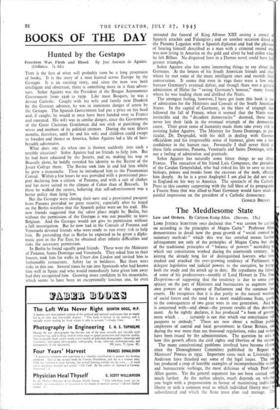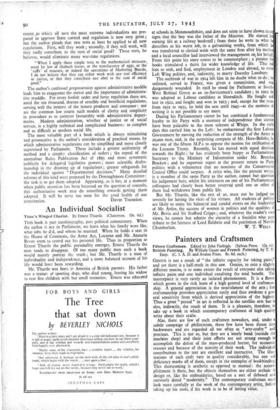The Meddlesome State
Law and Orders. By Carleton Kemp Allen. (Stevens. 15s.) LORD JUSTICE SCRUITON once declared that " war cannot be carried on according to the principles of Magna Carta." Professor Allen demonstrates in detail now the great growth of " social control by summary methods" which this war has entailed means further infringement not only of the principles of Magna Carta. but also of the traditional principles of " balance of powers " according to which our constitution worked during the nineteenth century. In joining the already long list of distinguished lawyers who have studied and attacked the ever-growing tendency of Parliament to delegate legislative and judicial powers to the executive, he brings both the study and the attack up to date. He repudiates the fallacy of some of his predecessors—notably of Lord Hewart in The New Despotism—of supposing that the tendency is due to some Co. spiracy on the part of Ministers and bureaucrats to augment that own powers at the expense of Parliament and the common law courts. He recognises that it is due partly to the natural working of social forces and the need for a more meddlesome State, partly to the consequences of two great wars in one generation. And he is concerned with—and about—the present results of this develop- ment. As he rightly declares, it has produced " a form of govern' ment which . . . certainly is not that which our constitution still purports to embody." There are now about a million public employees of central and local government in Great Britain, and during the war more than ten thousand regulations, rules and orders have been issued by the administration. The question he asks Is how this growth_affects the civil rights and liberties of the citizen.
The many constitutional problems involved have become clearer since the Donoughmore Committee published its Report 04 Ministers' Powers in 1932. Important cases such as Liversidge Anderson have thrashed out some of the legal issues. The ww has produced a crop of horrible examples of incomprehensible order, and bureaucratic verbiage, the most delicious of which Professor Allen quotes. Yet the general argument has not been carried veal much further. As the author admits, much depends on whether you begin with a prepossession in favour of maximising individual liberty or seek a common weal to which individual liberty must he subordinated and which the State must plan and manage. Tile
extent jo which all save the most extreme individualists are pre- pared to approve State control and regulation is now very great ; but the author pleads that two tests at least be applied to all new regulations. First, will they work ; secondly, if they will work, will they really contribute to the sum of social good? These tests, he believes, would eliminate many war-time regulations.
" When I apply those simple tests to the mathematical measure-
ment by law of rhubarb leaves, or the translucency of eggs, or the ' cuffs ' of trousers, or indeed the operations of Marketing Boards, I do not believe that they can either work with any real efficiency or justice, or that they contribute one obol to the sum of social good."
The author's confessed prepossession against administrative meddle leads him to exaggerate the extent and the importance of administra- tive muddle. For every foolish order and fussy regulation there are, amid the ten thousand, dozens of sensible and beneficial regulations, serving well the interest of the honest producer and consumer: nor are the common law courts such models of clarity and simplicity in procedure as to contrast favourably with administrative depart- ments. Modern administration, whether of justice or of social service, is a highly technical and complicated business: as complex and as difficult as modern social life.
The most valuable part of a book which is always stimulating and provocative is the author's consideration of practical means by which administrative regulations can be simplified and more closely supervised by Parliament. These include a greater uniformity of method and a simple' classification of orders ; the repeal of the anomalous Rules Publication Act of 1893 and more systematic publicity for delegated legislative powers ; more scientific drafts- manship in the drawing up of regulations ; greater safeguards for the individual against " Departmental decisions." Many detailed reforms of this kind were proposed by the Donoughmore Committee: the task is to get them adopted Appearing, as it has, at a moment when public attention has been focussed on the question of controls, this authoritative work may do something towards getting them adopted. It will be none too soon for the good health of our



























 Previous page
Previous page